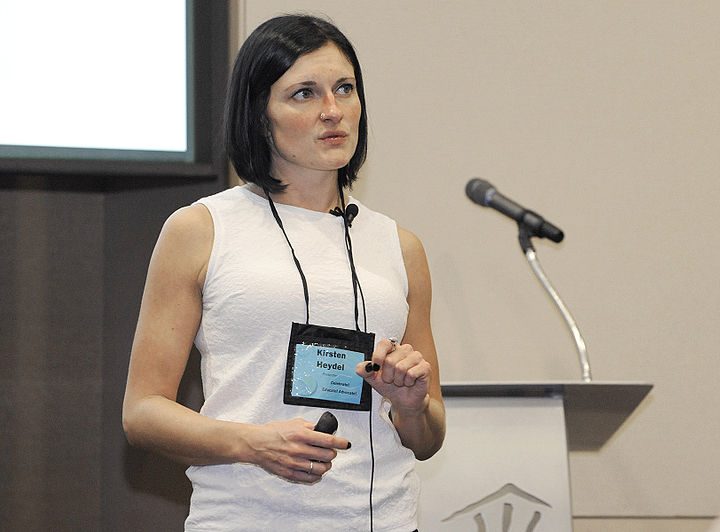Winner of the Fall 2018 StMU History Media Award for
Best Article in the Category of “Human Rights”
Have you ever wanted to make some easy money by selling your old stuff? Thanks to websites like Craigslist and Backpage, you can. Both Craigslist and Backpage are two of the largest classified advertisement websites. They allow you to search for and sell items in and around your local area. They even give you the option to post advertisements for job listings, events and activities. Craigslist was founded in 1995, and Backpage was founded in 2004.1 Craigslist is owned by its founder Craig Alexander Newmark, and Backpage was formerly owned by Village Voice Media and was run by its former CEO Carl Ferrer. Backpage is now owned by a Dutch company called Atlantische Bedrijven CV.2 These websites may seem like a harmless way to look for products and services, but the truth is these websites had a personal ad section that made it easy for young girls and women to be sexually exploited.

The personal ad section on these websites allowed for people to meet men and women in their area. Typically, these ads were used to find someone to date or with whom to have casual sex. Although these personal ad sections were intended for people to connect and interact with other persons, they were misused. These ads turned into the perfect platform for pimps and traffickers to promote the sale of women and children for sex. As shocking as it sounds, research has shown that the internet is a common tool for sex traffickers to use. Using the internet allows traffickers to reach a larger number of potential clients while eluding law enforcement.3 For them, the internet is the safest way to make money. The service providers Craigslist and Backpage, however, did nothing to stop people from using their websites in this way. Instead of preventing the ads from being posted or taking them down, they published them.
Several people filed lawsuits against Craigslist and Backpage because they wanted these websites to be held liable for publishing sex ads.4 After being faced with backlash, Craigslist and Backpage agreed to implement some requirements for their advertisements. In 2008, Craigslist required a fee for those persons posting in the “adult services” part of their personal ad section. The fee ranged between 5-10 U.S. dollars per ad. People would need to use a valid credit card and provide a verifiable phone number. This requirement, however, did not have much of an impact. Many traffickers simply used fake credit cards and phone numbers to pay the fee.5 Through these fees, Craigslist and Backpage made a huge profit. Craigslist made $44.6 million from their adult services advertisements and Backpage made $24 million.6 Their adult section, however, was the only one with a fee attached. To get around the fee, people would simply post their sex ads in other sections. Another attempt made by Craigslist and Backpage to reduce the chances of sex trafficking was removing posts with words such as “sexy” and “young.” This also proved to be ineffective. People would use code words so that their ads would not be removed. For example, pimps and traffickers used words like ‘new’ to indicate that the girl was a minor. Backpage even helped to edit advertisements by changing the words so that they would not get flagged or reported.7 The websites changes were not effective in reducing the number of sex ads posted. Craigslist and Backpage still failed to consistently block ads for illegal activity such as sex trafficking.

Many women and children were trafficked through these websites. In one case, three young women were repeatedly raped while they were minors when they were sold through Backpage’s website. Each of these victims filed a lawsuit against Backpage back in October 2014. This case is known as Doe v. Backpage.com. The lawsuit claimed that the classified ad company had engaged in sex trafficking of minors. They argued that the websites were engaged in trafficking since they did such a poor job in governing the content of the ads being posted. The U.S. Court of Appeals for the First District ruled in favor of Backpage and held that Backpage was protected under U.S. Code Title 7 Section 230, more commonly known as the Communications Decency Act (CDA). 8
] The purpose of the CDA is to regulate interactive computer services. The CDA makes it the policy of the United States “to preserve the vibrant and competitive free market that presently exists for the Internet and other interactive computer services” and “to ensure vigorous enforcement of Federal criminal laws to deter and punish trafficking in obscenity, stalking, and harassment by means of computer.”9
In their decision, the Court of Appeals argued that by claiming that Backpage facilitates sex trafficking through its posting rules, you are treating Backpage as the publisher of the content which the CDA prohibits. Section 230 subsection (c) states, “No provider or user of an interactive computer service shall be treated as the publisher or speaker of any information provided by another information content provider.”10 The Court believed that Backpage should not be held responsible for what its customers convey on its website. Just a year prior to this case, another lawsuit was brought against Backpage. This case was Backpage.com, LLC v. Cooper. In this case, just like in Doe v. Backpage.com, Backpage argued that they had no knowledge of the content posted on their website. The Court ruled that their classified ads were protected under the First Amendment of the Constitution. They argued that it is unlawful to censor an entire category of speech on a website. They also stated that it would place “an impossible burden” on Backpage to review the millions of ads posted on its website.11
Just like Backpage, Craigslist was faced with numerous lawsuits. Those who brought lawsuits against Craigslist wanted them to be liable and accountable for allowing such advertisements to be published on their website.12 Many advocates fought hard against these two companies. They wanted the sex advertisements on these websites to be criminalized, and to put an end to the use of online classified ads to exploit both adults and children.

The most recent legislation dealing with online sex trafficking was introduced by the Senate. Earlier this year, it was passed by Congress. This piece of legislation is an anti-sex-trafficking bill known as the Stop Enabling Sex Traffickers Act. This act is an exception to Section 230 of the CDA. This Act states, “section 230 was never intended to provide legal protection to websites that facilitate traffickers in advertising the sale of unlawful sex acts with sex trafficking victims; and that clarification of section 230 is warranted to ensure that that section does not provide such protection to such websites.“13 Essentially, this Act allows for sex trafficking victims to sue the websites through which they were trafficked. As a result from the passing of this bill, Craigslist shut down its personal ad section; however, this website remains active today. Backpage, on the other hand, was seized by the FBI and it remains seized to this day. Although action was taken against these websites, there are still several other active websites similar to Craigslist and Backpage. Those who relied on the two sites for sex trafficking have turned to other places on the internet. Shutting down sex advertisements in these cases have not stopped pimps from trafficking young girls and women online; it has just moved their operations to other providers. Despite efforts to target and censor websites like Craigslist and Backpage, trafficking displacement is an inevitable consequence.14 The FBI, however, is making an effort to monitor different forms of illegal activities online, especially sex trafficking. One way we can help fight online sex trafficking is by going after those websites that allow it to happen. If you go to the FBI website, you will find information on how to report instances of human trafficking. The FBI informs us to call the National Human Trafficking Resource Center (NHTRC) if we believe that we are a victim of a trafficking situation or if we have information on a potential trafficking situation. We can reach the NHTRC at 1-888-373-7888, where we can talk to specialists who answer calls at anytime from anywhere. 15 Do not be afraid to seek out help or to report what you believe may be a trafficking situation. Let’s help put an end to online sex trafficking!
- Shana M. Judge, “The Effect of Measures Taken by Craigslist to Screen Online Ads for Commercial Sex,” Social Science Computer Review 36, no. 3 (June 2018): 298. ↵
- Marie- Helen Maras, “Online Classified Advertisement Sites: Pimps and Facilitators of Prostitution and Sex Trafficking,” Journal of Internet Law 21, no. 5 (2017): 17. ↵
- Erin Heil and Andrea Nichols, “Hot Spot Trafficking: A Theoretical Discussion of the Potential Problems Associated with Targeted Policing and the Eradication of Sex Trafficking in the United States,” Contemporary Justice Review 17, no. 4 (2014): 422. ↵
- Shana M. Judge, “The Effect of Measures Taken by Craigslist to Screen Online Ads for Commercial Sex,” Social Science Computer Review 36, no. 3 (June 2018): 298. ↵
- Shana M. Judge, “The Effect of Measures Taken by Craigslist to Screen Online Ads for Commercial Sex,” Social Science Computer Review 36, no. 3 (June 2018): 299. ↵
- Erin Heil and Andrea Nichols, “Hot Spot Trafficking: A Theoretical Discussion of the Potential Problems Associated with Targeted Policing and the Eradication of Sex Trafficking in the United States,” Contemporary Justice Review 17, no. 4 (2014): 428. ↵
- Erin Heil and Andrea Nichols, “Hot Spot Trafficking: A Theoretical Discussion of the Potential Problems Associated with Targeted Policing and the Eradication of Sex Trafficking in the United States,” Contemporary Justice Review 17, no. 4 (2014): 429. ↵
- Kerianne Strachan, “Doe v. Backpage.com: The United States Court of Appeals Further Extends Immunity for Internet Service Providers Under the Communications Decency Act,” Tulane Journal of Technology & Intellectual Property 19, (2016): 262 and 47 U.S. Code § 230 – Protection for private blocking and screening of offensive material, and S.652 – Telecommunications Act of 1996 enacted by 104th Congress (1995-1996). ↵
- § 230. Protection for private blocking and screening of offensive material, 47 USCS § 230 ( Current through PL 115-253, approved 10/3/18 ). https://advance-lexis-com.blume.stmarytx.edu/api/document?collection=statutes-legislation&id=urn:contentItem:4YF7-GV61-NRF4-44C3-00000-00&context=1516831. ↵
- § 230. Protection for private blocking and screening of offensive material, 47 USCS § 230 ( Current through PL 115-253, approved 10/3/18 ). https://advance-lexis-com.blume.stmarytx.edu/api/document?collection=statutes-legislation&id=urn:contentItem:4YF7-GV61-NRF4-44C3-00000-00&context=1516831. ↵
- Marie-Helen Maras, “Online Classified Advertisement Sites: Pimps and Facilitators of Prostitution and Sex Trafficking,” Journal of Internet Law 21, no. 5 (2017): 18. ↵
- Shana M. Judge, “The Effect of Measures Taken by Craigslist to Screen Online Ads for Commercial Sex,” Social Science Computer Review 36, no. 3 (June 2018): 298. ↵
- S. 1693, 115th Cong. (2018) Stop Enabling Sex Traffickers Act (enacted). ↵
- Erin Heil and Andrea Nichols, “Hot Spot Trafficking: A Theoretical Discussion of the Potential Problems Associated with Targeted Policing and the Eradication of Sex Trafficking in the United States,” Contemporary Justice Review 17, no. 4 (2014): 432. ↵
- “Human Trafficking/Involuntary Servitude.” FBI. May 03, 2016. Accessed October 30, 2018. https://www.fbi.gov/investigate/civil-rights/human-trafficking. ↵



180 comments
Aneesa Zubair
This article is extremely well-written, and you chose an important topic! I didn’t know much about this issue, but you did an excellent job explaining how seemingly harmless sites like Craigslist and Backpage have been used for human trafficking. It angered me that Craigslist’s initial response was to start charging fees in the adult services section, as that allowed them to make money off illegal ads instead of actually preventing them. I’m glad that has changed, although trafficking continues to be a major problem today.
Daniel Linstead
I never knew that craiglist was used for sex trafficking. I thought it was a harmless website where you can buy things that you want in life like cars, furniture, and other items along those lines. I am appalled to find this out it is just sickening to think. I just don’t understand how the websites don’t have regulations against it and they allow something illegal to happen on their websites I just can’t wrap my head around it.
Didier Cadena
This was a very interesting article. I was not too familiar with the whole Craigslist and Backpage trafficking scandals, so this article was able to help me learn a little more about it. It is sickening to see how this blatant abuse of a website was able to go one for so long. The changes that were made to it seemed not to have worked. The article does a great job of putting all of the information together and keep the reader engaged throughout it.
Natalie Juarez
This article was organized, informative and well written that shined light on sex trafficking through an act that seems harmless, such as using the websites Craigslist or Backpage. The thought of online shopping and then becoming a victim of sex trafficking as the product is something I never even thought could happen for it never crossed my mind. I find it disturbing that the websites did not try harder to keep this harmful issue from happening, which makes me realize how much money is more important than humanity to a lot of companies and people.
Jose Fernandez
This is a very shocking story! Who would have thought that websites that are used daily by many people are also used for horrendous crimes. This is a very intense story and I think it is important that everyone knows it. In my opinion, websites were situations like sex trafficking occur should be disabled and investigated. This article is very well written and I can tell the author did a lot of quality research prior to its writing.
Irene Astran
The internet is so vast that I do not believe there is any sufficient way to completely do away with this problem. As we could tell through the innovations of Craigslist, it is even hard for the website managers themselves to effectively police their own domains. I wonder what other entities are working to police internet web pages across the board.
Enrique Segovia
I am astonished to read that two websites so prominent for the public are used for sex trafficking. Despite the good uses of Craigslist, it is now looked down upon for this unexpected case. I would have never imagined that this website would be used for such a horrible cause. Also, I think it is unethical of Craigslist that they ignored the fact that there were sex traffickers on their website, just because that was giving them a profit. Definitely, this article made me think about several issues that many websites have, but they ignore them just for the money.
Ximena Mondragon
This article is very interesting because I’ve only heard of Craigslist but not of Backpage. It is very wrongful for such websites to have such loose restrictions just to have more profit. I am glad that now people can sue these companies and hold them liable . This article is very well written and it gives readers plentiful of information. I think this article should be used when educating students regarding the dangers of such websites.
Angel Torres
People use Craigslist and backpage to buy everyday stuff like cars, furniture, pets, etc. Hoewever many people do not know about the sex trafficking that occurs behind the scenes of website similar to Craigslist. I was shocked to find out that companies like Craigslist and backspace don’t enforce regulations to prevent sextrafficking in their sites. The Stop Enabling Sex Traffickers Act puts an end or makes it harder for companies to legally use the Comunication Deceny Act as a defense. Well written and very informative article
Gabriela Ochoa
This is a really great article and a very important topic to be discussed in today’s society. I knew of websites using ads as a way to trafficking girls and women but never knew that such a commonly used website as Craiglist, which is constantly being advertised as one of the best websites to be used. Its sad to read that the website wasn’t shut down and continues to run just because they said it wasn’t their fault people decided to publish ads like that. I hope that the executive order that was passed will help in some way to stop these terrible things from happening.